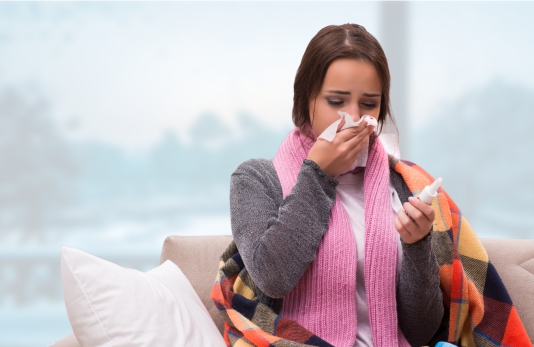As winter is here, many of us find ourselves sniffing and coughing more often. It’s the first common sign that people notice when sickness sets in.
While the cold weather and cozy festivities may be appealing, they also bring illnesses. Some of the common illnesses in winter are the common cold, flu, respiratory problems, and stomach infections. The symptoms could vary depending on the illness.
When talking about the common cold, it shows symptoms such as a runny nose accompanied by sneezing, coughing, and a sore throat. It typically lasts for a few days, rarely extending for a week. If it is the flu, the most noticeable symptoms are fever with chills and body aches accompanied by extreme fatigue and a cold. These symptoms could last for a few days to a few weeks.
These ailments are highly contagious, spreading from sick people to those in close proximity through sneezing or coughing. Tiny drops with germs are released into the air, and if someone nearby breathes them in, they can get sick too.
Reasons For Being More Likely To Get Sick During The Winter Season
One of the primary reasons for the surge in illnesses during the winter is the prevalence of viruses, particularly the influenza virus, which is responsible for causing flu.
Moreover, people tend to spend more time indoors during the colder months, leading to closer proximity and easier transmission of these viruses. The airborne droplets carrying viruses can stay longer than usual in the dry winter air, increasing the likelihood of infection.
Exposure to cold temperatures can weaken the immune system, making individuals more susceptible to infections. Cold weather can reduce the immune system’s ability to fight against viruses, and so the virus penetrates the body easily.
Additionally, reduced sunlight during the winter means less production of vitamin D, which can further compromise the body’s ability to fight off infections.
Cold weather often discourages us from engaging in outdoor physical activities, leading to a more sedentary lifestyle during the winter. Regular exercise is essential for a healthy immune system, and a lack of it can contribute to increased vulnerability to illnesses.
Ways To Prevent Illness During The Winter Season
Taking proactive measures can reduce the chances of getting sick. While embracing the season, take care of yourselves to ensure a happy and healthy winter.
- Frequent handwashing is your first line of defense against winter germs. So wash your hands thoroughly and regularly. When soap and water are not available, use hand sanitizers as an alternative.
- Do not share personal items like handkerchiefs to minimize the risk of transmission.
- When sneezing, cover your nose and mouth with a tissue – do not use your hand.
- Additionally, avoid touching your face (eyes, nose, or mouth) with uncleaned hands.
- Drink plenty of water throughout the day. Make sure you do not overdrink, which may affect the kidney’s function.
- Fuel your body with a nutrient-rich diet to support your immune system. A healthy and balanced diet includes fruits, vegetables, whole grains, and lean proteins.
- Foods rich in vitamin C are preferable to boost your immune system. Most importantly, you should avoid roadside foods.
- Layer your clothing to maintain your body’s internal temperature. Don’t forget to cover your extremities, as hands, feet, and ears are particularly susceptible to the chill.
- Don’t let the colder weather be an excuse for regular exercise. Engage yourself in indoor activities like gym workouts, yoga, or dance classes. If the weather permits, engage in brisk outdoor walks.
- Prioritize stress management techniques such as meditation, deep breathing exercises, or spending time doing activities you enjoy.
- Get enough quality sleep each night.
Dealing With Illness In Winter?
If symptoms persist, don’t ignore them, as this could lead to complications when it is associated with any underlying medical conditions.
- If the fever continues for more than 3 days and the temperature remains consistently high, especially if it exceeds 102 degrees Fahrenheit.
- Any difficulty in breathing or persistent wheezing
- If there are signs of severe dehydration, such as persistent dizziness, an extremely dry mouth, or dark urine.
- Unexplained and extreme weakness or fatigue that doesn’t improve with rest.
In such cases, it is recommended to consult with Dr. Mehta’s physicians for proper evaluation and guidance.
Early detection & diagnosis and medical advice can be important in managing and treating potential health issues.
While winter brings joy and celebration, it is also the time for you to take extra care to stay away from illness. By adopting preventive measures, practicing good hygiene, and seeking prompt attention when needed, we can ensure a healthier and more enjoyable winter season.
Stay warm! Stay well with Dr Mehta’s!

